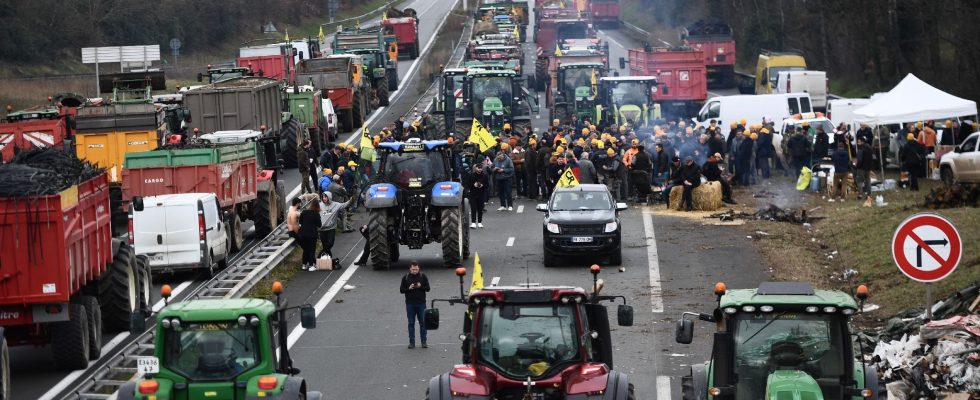It only took a few days for a local action to take on a national scale, arousing the government’s concern: after the blocking of the A64 motorway between Toulouse and Bayonne on Friday, farmers increased the number of roadblocks, in an “agricultural resistance” movement. The revolt, quickly taken up by the unions, led the Prime Minister to receive representatives of several unions on Monday.
If the president of the FNSEA, Arnaud Rousseau, announced Wednesday on franceinfo that “forty” “clear demands” would be published this evening, the main reasons for the sector’s anger are already known. The speeches of representatives of the main unions reveal a multitude of demands, and some tensions.
Maintaining a tax loophole on fuels
One of the main demands of farmers revolves around the disappearance of a tax loophole on non-road diesel (GNR) programmed by the government. This fuel, similar to diesel, distributed in service stations but intended for tractors, is colored red: a way of checking that farmers do not benefit from the tax rebate for their personal vehicles. But to encourage professionals to consume less, the government has embarked on the path of reducing the tax refund granted.
Negotiations carried out in June by the FNSEA with the executive made it possible to retain part of this advantage, to spread its gradual disappearance until 2030, and to obtain compensation, Arnaud Rousseau underlined on January 10.
But the measure remains unacceptable for many farmers and causes tensions between the two main unions. “The FNSEA is at the origin of part of all these evils […], they were the ones who negotiated the increase in GNR taxation. They create the problems and they believe they bring us the solutions,” denounced Véronique Le Floc’h, president of Rural Coordination at the microphone of Sud radio.
The right supports the revolt against this measure: “The government must immediately renounce this measure”, argued the president of the Les Républicains group in the National Assembly, Olivier Marleix.
“Dignity” of the profession
At the end of their meeting with the Prime Minister, Gabriel Attal, and the Minister of Agriculture, Marc Fesneau, representatives of the FNSEA and the Young Farmers union expressed a problem with the “dignity” of the profession. “Today, it is a moral crisis that we are talking about, it is the agricultural world’s incomprehension of what the reality of its action is,” insisted the president of the FNSEA.
The crisis in the profession is reflected in particular by a high rate of suicide often cited to represent the difficulties suffered by farmers: according to a report from the Mutualité sociale agricole“in 2020, healthcare consumers under the agricultural scheme aged 15 to 64 have a risk of suicide mortality 30.9% higher than that of those insured under all schemes”.
“Stacking” of standards
Among farmers and their unions, anger against overly complex regulations is being heard. “We need concrete actions on overadministration, today a farmer spends too many hours filling out paperwork,” declared the president of the FNSEA interviewed on the Télématin show. “We are asking for more pragmatism and fewer standards for results,” said Véronique Le Floc’h, president of Rural Coordination, in a press conference on January 17.
Questioning European regulations
Several demands from the profession relate to the policy pursued by the European Union in matters of agriculture. Some, like the president of the FNSEA, are calling for an end to certain obligations, such as the fallowing of 4% of land to benefit from financial aid. The dispute also concerns certain free trade pacts concluded by the EU, such as that with Mercosur (Argentina, Brazil, Uruguay and Paraguay), never ratified.
The European Green Deal, a set of measures for the ecological transition of EU member states, which notably includes a reduction in pesticides and the development of organic farming, is also contested. The movement does not only affect France: in Germany, Romania and even Spain, farmer mobilizations are increasing. “The common foundation is the incomprehension of what the European framework is today,” explained Arnaud Rousseau on France Inter, denouncing the “vision […] clearly decreasing” of the European Green Deal.
Better pay
Another sticking point between farmers and the government is the question of remuneration and commercial negotiations. This point resurfaces, two years after the adoption of the “EGAlim 2” law, which aimed precisely to ensure them a decent income.
According to INSEE, “agricultural households are also more exposed to monetary poverty: 18% of their members live below the poverty line […]compared to 13% of household members with earned income”. And the pressure on prices practiced by supermarkets and large agri-food groups are regularly denounced by the profession.
“We are asking Emmanuel Macron for a law strictly prohibiting the purchase of our agricultural products below their cost price,” demanded the Confédération paysanne sur X.
During an exchange on Saturday with farmers, the Prime Minister, Gabriel Attal, took up the issue. “You must be able to live from your work,” declared the head of government, adding that there would be “more controls” in the annual negotiations with supermarket brands.
